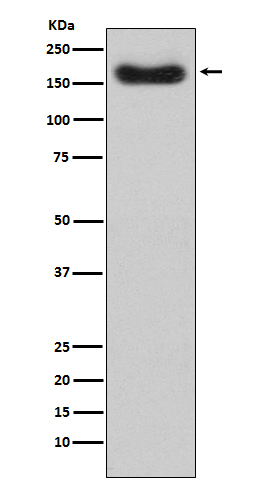
| WB | 咨询技术 | Human,Mouse,Rat |
| IF | 咨询技术 | Human,Mouse,Rat |
| IHC | 咨询技术 | Human,Mouse,Rat |
| ICC | 1/50-1/200 | Human,Mouse,Rat |
| FCM | 咨询技术 | Human,Mouse,Rat |
| Elisa | 咨询技术 | Human,Mouse,Rat |
| Aliases | AHUS1; AMBP1; ARMD4; ARMS1; beta1H; CFH; CFHL3; complement factor H, isoform b; Factor H; factor H like 1; FHL1; HF1; HF2; HUS;;Complement factor H |
| WB Predicted band size | Calculated MW: 139 kDa ; Observed MW: 180 kDa |
| Host/Isotype | Rabbit IgG |
| Antibody Type | Primary antibody |
| Storage | Store at 4°C short term. Aliquot and store at -20°C long term. Avoid freeze/thaw cycles. |
| Species Reactivity | Human |
| Immunogen | A synthesized peptide derived from human Complement factor H |
| Formulation | Purified antibody in PBS with 0.05% sodium azide,0.05% BSA and 50% glycerol. |
+ +
以下是3篇关于Factor H抗体的代表性文献摘要:
1. **《Anti-Factor H Autoantibodies in Atypical Hemolytic Uremic Syndrome》**
- 作者:Józsi M, et al.
- 摘要:研究揭示了非典型溶血性尿毒症综合征(aHUS)患者中存在抗Factor H自身抗体,这些抗体干扰Factor H与C3b的结合,导致补体系统过度激活,进而引发血管内皮损伤。
2. **《Factor H Autoantibodies and Genetic Mutations in C3 Glomerulopathy》**
- 作者:Zhang Y, et al.
- 摘要:分析了C3肾小球病患者中抗Factor H抗体与补体基因突变的关联,发现抗体通过阻断Factor H功能加剧补体旁路途径失调,为靶向治疗提供依据。
3. **《Autoantibodies to Complement Factor H in Children with Post-Streptococcal Glomerulonephritis》**
- 作者:Dragon-Durey MA, et al.
- 摘要:首次报道链球菌感染后肾小球肾炎患儿体内存在抗Factor H抗体,提示此类抗体可能通过抑制补体调控参与疾病发病机制。
4. **《Therapeutic Targeting of Anti-Factor H Autoantibodies in a Mouse Model》**
- 作者:Nozal P, et al.
- 摘要:通过小鼠模型验证了血浆置换和B细胞靶向疗法清除抗Factor H抗体的有效性,为临床治疗抗体介导的补体相关肾病提供了实验支持。
这些研究覆盖了抗体致病机制、疾病关联及治疗方向。如需具体期刊名或年份,可进一步补充关键词缩小范围。
Factor H (FH) antibodies are immunological tools designed to target complement factor H, a critical regulatory protein in the complement system. Factor H, a 155 kDa glycoprotein produced primarily in the liver, plays a pivotal role in inhibiting the alternative complement pathway. It prevents uncontrolled activation by binding to host cell surfaces and microbial pathogens, blocking C3 convertase formation, and accelerating its decay. Dysregulation of FH is linked to several diseases, including atypical hemolytic uremic syndrome (aHUS), age-related macular degeneration (AMD), and C3 glomerulopathy.
FH antibodies, both polyclonal and monoclonal, are widely used in research and diagnostics. They enable the detection and quantification of FH in biological samples via techniques like ELISA, Western blotting, and immunohistochemistry. In therapeutic contexts, anti-FH antibodies are explored to modulate complement activity. For example, neutralizing antibodies may counteract pathogenic FH variants in aHUS, while enhancing antibodies could stabilize FH function in AMD. However, challenges persist, such as ensuring target specificity and avoiding unintended complement activation.
Therapeutic development has seen mixed outcomes; lampalizumab, an anti-FH Fab antibody tested for AMD, showed limited efficacy in clinical trials. Nonetheless, FH antibodies remain vital for studying complement-related pathologies and advancing precision therapies targeting the complement cascade.
×